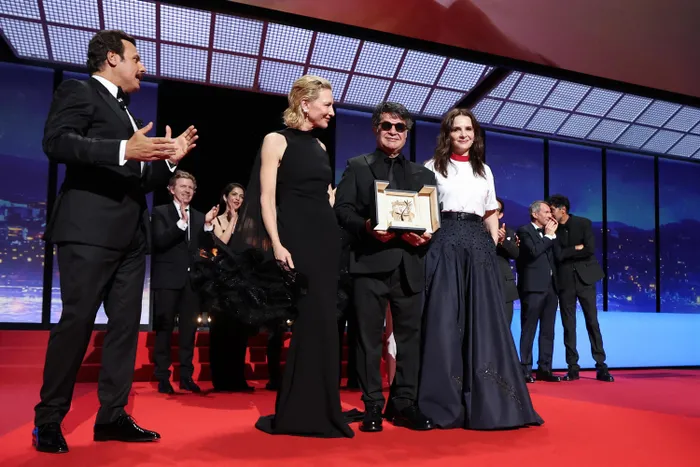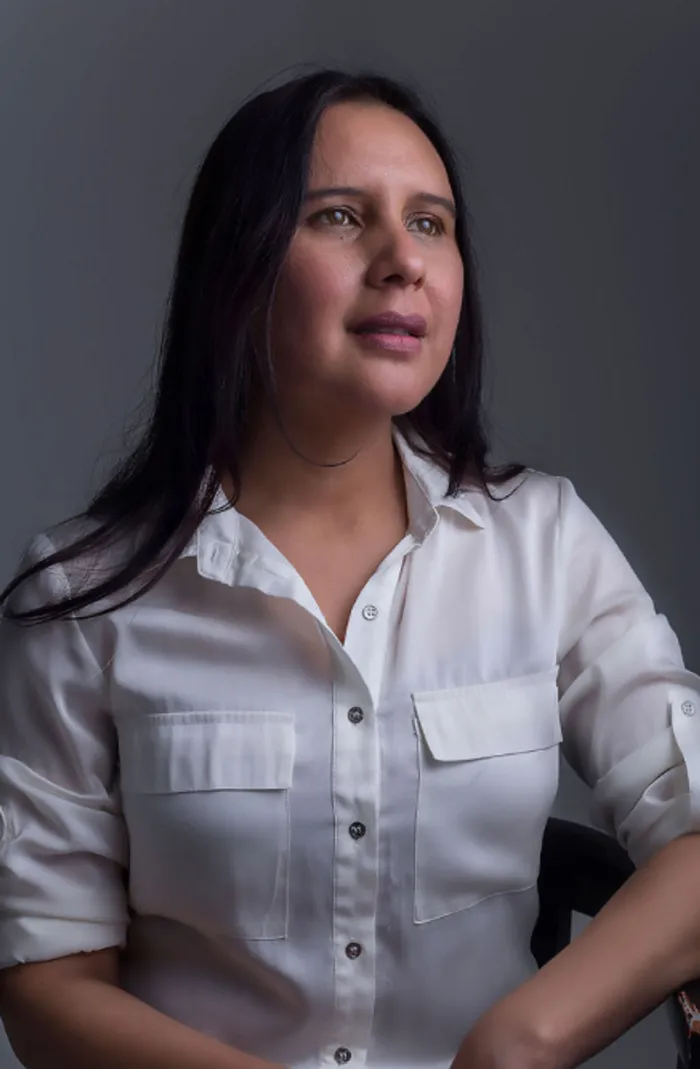South Africa at Cannes: A Story of Overlooked Talent and Systemic Barriers

French actor and master of ceremony Laurent Lafitte (L) gestures on stage as Iranian director and screenwriter and producer Jafar Panahi (C) poses on stage with Australian actress Cate Blanchett (centre L) and French actress and president of the jury of the 78th Cannes Film Festival Juliette Binoche after winning the Palme d'Or for the film "Un simple accident" (A Simple Accident) during the closing ceremony at the 78th edition of the Cannes Film Festival in Cannes, southern France, on May 24, 2025.
Image: Valery Hache / AFP
The Cannes Film Festival remains synonymous with Hollywood glamour, it also serves as a vital platform for lesser-known filmmakers and actors to gain recognition for their exceptional work often produced on budgets far smaller than those of major studios.
This year was particularly remarkable for Middle Eastern cinema. The prestigious Palme d’Or was awarded to Iranian writer-director Jafar Panahi for his gripping thriller "Unsimple Accident," filmed without approval from the Islamic Republic. Meanwhile, "Once Upon a Time in Gaza" won Best Director in the Un Certain Regard section, and Iraqi filmmaker Hassan Hadi took home the Camera d’Or for "The President’s Cake." French-Algerian actress Nadia Melliti earned Best Actress for her role in "The Little Sister," and Palestinian director Tawfeek Barhoum won the Palme d’Or for Short Film with "I’m Glad You’re Dead Now." These triumphs highlight not only the exceptional craftsmanship of Middle Eastern cinema but also the global fascination with authentic, auteur driven stories from the Islamic world.
In the festival’s 78-year history, only two South African films have been selected for the Cannes Official Selection. This year, Oliver Hermanus’ "The History of Sound," a privately funded gay period drama starring Paul Mescal and Josh O’Connor, competed in the main selection. Based on the eponymous short story, the film marks South Africa’s second appearance in the Cannes Official Selection.
The first was Elaine Proctor’s "Friends" (1993), a poignant drama about three women from different factions of South African society sharing a house in Johannesburg at the twilight of apartheid. Notably, “Friends" is written and directed by a woman, shot by a female cinematographer (Dominique Chapuis), and featuring a predominantly female cast, received an Honourable Mention for the Camera d’Or. This was a monumental achievement, especially considering that, in its 78- year history, only 82 women directors have been included in Cannes’ Official Selection. Today, Proctor is a critically acclaimed novelist based in the UK.
As a writer-director, I was inspired by Proctor’s legacy. After completing the screenplay for my feature "Two Hues," I reached out to her, and to my delight, she responded. She agreed to direct the film—pending funding—after reviewing the script and offering valuable feedback. For any writer, such validation is invaluable.
Bolstered by Proctor’s involvement, I applied for funding through South Africa’s National Film and Video Foundation (NFVF). Despite her prestige, my applicationswere rejected. Through conversations with industry insiders, I learned that the NFVF has, over the past five years, prioritised a select group of producers and directors, maintaining a status quo that sidelines independent voices, no matter their merit. This raises serious concerns about transparency, panel selection, and equitable processes.
Since its inception in 1999, the NFVF has been mandated to promote equity and inclusion in South African cinema. Yet, in 26 years, it has never funded a single South African film selected for The Cannes Official Selection. Instead, millions of rands are spent annually on sending delegations to Cannes, hosting events, and maintaining a presence at the festival, now reduced from a pavilion to a mere stand.
In 2018, my documentary "District Six: Rising from the Dust" was showcased at the Marché du Film. While I initially underestimated its significance, the South African press recognised its impact, given its exploration of forced removals and District Six’s history.
Navigating Cannes alone was daunting. The festival’s overwhelming Hollywood-centric atmosphere, red carpets, star-studded premieres, and industry giants, made it clear that independent and documentary filmmakers operate on the periphery. However, I eventually found my footing at Cannes Docs (then Doc Corner), where Pierre-Alexis Chevit expressed interest in my work and proposed a South African showcase for the following year.
Back home, I facilitated an introduction between the NFVF and Cannes Docs, only to face exclusion from the subsequent call for submissions. Fortunately, Cannes Docs intervened with a direct invitation, forcing the NFVF to include me. Yet, at the festival, our delegation received no logistical or promotional support, no pitch training, no introductions, and notably no attendance from NFVF leadership, despite their presence at Cannes. This neglect stood in stark contrast to the robust support other nations, like Palestine, provided their filmmakers.
In recent years, the NFVF has funded one documentary annually for a Cannes Docs spotlight— without an open industry call. Instead, selections are made in collaboration with Encounters Documentary Festival, raising concerns about fairness and transparency. Why should a festival funded by the NFVF gatekeep such opportunities?
This year (2025), the NFVF was conspicuously absent from Cannes, with only the IDC and KZN Film Commission representing South Africa. In a letter to the NFVF Council, Minister Gayton McKenzie denied travel approval for NFVF, urging compliance with the NFVF Act, which mandates that 75% of its budget be allocated to film production.
As an industry, we continue advocating for structural reform, transparent processes, adherence to legislation, and better support for intellectual property. Only then can South African filmmakers truly compete on the global stage.

Weaam Williams is a multiple award-winning filmmaker, actress and tech founder.
Image: Supplied
* Weaam Williams is a multiple award-winning filmmaker, actress and tech founder.
** The views expressed do not necessarily represent those of Independent Media or IOL.
Related Topics: